It looks like you're using an Ad Blocker.
Please white-list or disable AboveTopSecret.com in your ad-blocking tool.
Thank you.
Some features of ATS will be disabled while you continue to use an ad-blocker.
share:
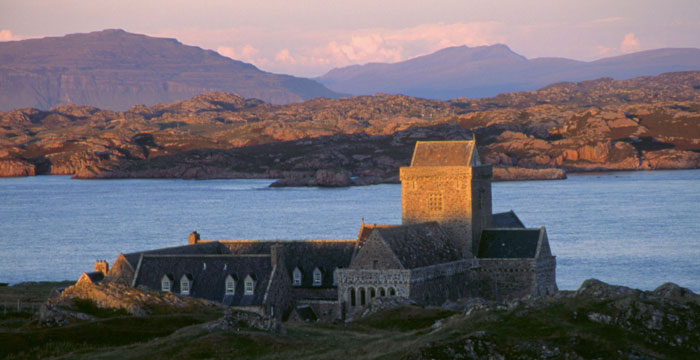
St. Columba (Colum Cille – dove of the church) arrived by boat from Ireland in 563, and landed in Kintyre, Scotland. Legend has it that he moved onwards, up to the isle of Iona as his homeland was still in sight. Kintyre would have been part of Dal Riada in the 6th century and Columba’s mission was to bring Christianity to the Picts.
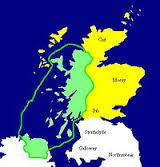
And so he settled on Iona and built a monastery there. Columba remained in Scotland for the rest of his life, returning latterly to Ireland only to found the monastery at Durrow. He was buried on Iona, in his abbey, and his relics were divided between Scotland and Ireland.
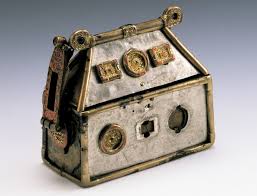
( The Monymusk Reliquary, thought to be the brechbennoch carried by Robert the Bruce at Bannockburn. The relics of Colum Cille are now lost – a hand, and other bones – probably destroyed during the Reformation).
In his lifetime St Columba is credited with transcribing over 300 books and authoring several hymns. His biographer, Adomnan, wrote his hagiography a century after Colum Cille’s death and provides much information about his daily life and his miracles.
Writing a century after the death of Saint Columba, the author Adomnán (also known as Eunan), served as the ninth Abbot of Iona until his death in 704 A.D.[23]
James Earle Frasier asserts that Adomnán drew extensively from an existing body of accounts regarding the life of Saint Columba, including a Latin collection entitled "De uirtutibus sancti Columbae", composed c. 640 A.D. This earlier work is attributed to Cummene Find, who became the abbot of Iona and served as the leader of the monastic island community from 656 until his death in 668 A.D. or 669 A.D.[24]
While the Vita Columbae often conflicts with contemporaneous accounts of various battles, figures, and dates, it remains the most important surviving work from early medieval Scotland and provides a wealth of knowledge regarding the Picts and other ethnic and political groups from this time period. The Vita also offers a valuable insight into the monastic practices of Iona and the daily life of the early medieval Gaelic monks.
Adomnan tells us that books were certainly written in the abbey, but Scottish history has many riddles and myths. Where are these books now?
It is said that Colum Cille inherited a vast library, the most spectacular in Europe. Prior to his arrival, Iona was known as Innis nam Druidneach –the island of the Druids. In a bid to avoid persecution by the ever-encroaching Romans, the Druids fled to Iona and there they stored their treasured books in the greatest library Europe had seen.
Other stories tell that King Fergus gave his collection of plundered Greek and Persian religious tomes to the Druids for safe keeping. There is a persistent theme here; books given to allies and hidden for safe keeping.
“There was a Scottish King named Fergus II, that he accompanied Alaric the Goth, and that he sent to the monastery of Iona a box of books – being part of the booty obtained by him at the sacking of Rome.
This story is inconsistent with chronology, for Rome was plundered by Alaric in the year 410, more than a hundred years before Columba, who is said to have been born in 521. There was a report that the lost books of Livy were preserved in this library. Aeneas Sylvius (afterwards pope Pius II) intended, when in Scotland, to visit Iona to search for them, but was prevented by the death of King James I. ...
Of the existence of a collection of books at Iona, however, there can be no doubt. Otherwise Aeneas Sylvius would never have resolved on a journey thither. Boethius too had undeniable proof of it ....*
When the Vikings came in 795 AD century, it was assumed that they were the destroyers of the books and countless relics.
Of course, there are many that dispute the stories as being mere myth and legend only. No books have been found, and so there is no evidence for such a tall tale. Except...we have an example of a Columban book to day.
One of the most famous of these books from Iona is the Book of Kells, an example of the skill and craftsmanship available at the time. But if the Book of Kells survived – where are the others? Were they hidden in Ireland too, or buried on Iona itself?
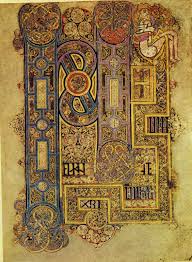
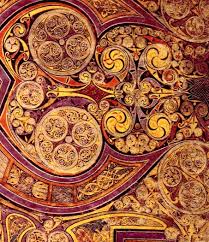
And so there can be no doubt that books were written in the abbey. But where are they now?
Hector Boece (1465-1536) wrote his ‘History of the Scottish People’ using a book he claimed he found in Iona Abbey. His claims have been discredited, as is the way with a large part of Celtic history.
Archaeology students from St. Andrews University conducted a dig on the Treshnish Islands, near Iona, in the 1950’s but returned to the mainland empty handed. If this library of Iona could ever be found, it could furnish us with the most wonderful history of the early Celtic church, of the Culdees and of the Druids too.
It is worth bearing in mind that much of traditional Welsh history has survived today, simply by being kept hidden and handed down through families when Welsh culture was actively being suppressed. Is it possible that this tradition, which saved the Book of Kells, has also protected a priceless treasure trove of yet undiscovered Celtic literature?
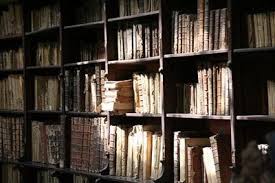
For further reading:
www.scotsman.com...
philipcoppens.com...
en.wikipedia.org...
www.bbc.co.uk...
*The Biblical Repository, p553
edit on 22-12-2015 by beansidhe because: punc
I had no idea of a lost library, though I assume all monestaries had books sourced from far corners.
I read Divine Adventures: Iona by Finoa MacLeod years ago, I dont remember this though.
Obligitory Kells Cat tax:
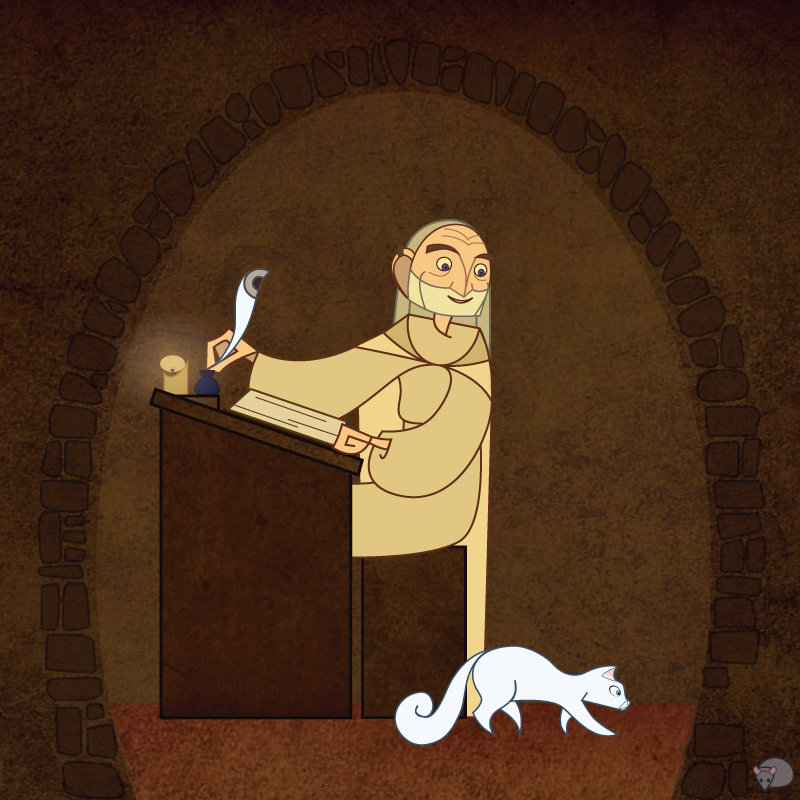
I read Divine Adventures: Iona by Finoa MacLeod years ago, I dont remember this though.
Obligitory Kells Cat tax:

a reply to: Butterfinger
It's one of those persistent stories which is woven into Scottish history.
I still haven't seen The Secret of Kells movie yet, I'll try to watch it over Christmas.
Thanks for reading.
It's one of those persistent stories which is woven into Scottish history.
I still haven't seen The Secret of Kells movie yet, I'll try to watch it over Christmas.
Thanks for reading.
a reply to: beansidhe
Its a good flick, not long either.
Have you heard/read a book named "How the Irish Saved History?"
In a nutshell, its close to what you described. Irish(Dal Riada) based monks were the last repository and safest place for the old tomes and scrolls from the fall of Rome and the years preceding.
Theres bound to be tons, but Vikings and the Restoration was a massacre for literature too. I believe they found Lindisfarne Gospels in a sand dune on the beach. Imagine what else is out there.
Its a good flick, not long either.
Have you heard/read a book named "How the Irish Saved History?"
In a nutshell, its close to what you described. Irish(Dal Riada) based monks were the last repository and safest place for the old tomes and scrolls from the fall of Rome and the years preceding.
Theres bound to be tons, but Vikings and the Restoration was a massacre for literature too. I believe they found Lindisfarne Gospels in a sand dune on the beach. Imagine what else is out there.
edit on 12222015 by Butterfinger because: extra stuff
a reply to: Butterfinger
I didn't know that about the Lindisfarne gospels, but I do know that monks from Iona were sent to Lindisfarne to teach there. The Picts and the Northumbrians had a long entwined history, culminating in the battle of Dun Nechtain. It's a very interesting period in history (to me )
Is the book you mentioned by Thomas Cahill? I just searched for it and I think it's the right one. It looks great, I think I'll order it.
I didn't know that about the Lindisfarne gospels, but I do know that monks from Iona were sent to Lindisfarne to teach there. The Picts and the Northumbrians had a long entwined history, culminating in the battle of Dun Nechtain. It's a very interesting period in history (to me )
Is the book you mentioned by Thomas Cahill? I just searched for it and I think it's the right one. It looks great, I think I'll order it.
a reply to: beansidhe
I love lost library stories. Vlad's is the one I would like to find, although, Alcuin's library was supposed to, according to legend, to have been located where I work. I admit, I have been tempted to get the crowbar and lift the stone floor to have a dig, but knowing what is required to preserve manuscripts, ancient and modern, from crumbling to dust, being eaten by microbial life, or turning to wet mush, I don't think I'd find much left worth reading. The Nag Hammadi was blessed with being kept in a dry, almost hermetically sealed environment before discovery, but found by illiterates, it was of greater value as kindling. I suspect that the Vikings would have been similarly invested. Perhaps they took the pretty pictures back home and hung them as decoration? For them to still exist, in possibility let alone actuality, on Iona, they'd need a reasonable anaerobic environment. Any cave systems on Iona?
Good thread though, the Book of Kells is deeply beautiful and the work involved in it's manufacture unimaginable. Have you ever read about the process by which they collected the materials and produced their own inks and pigments, that in itself was an art form, requiring great knowledge of chemical and material processes in application.
I love lost library stories. Vlad's is the one I would like to find, although, Alcuin's library was supposed to, according to legend, to have been located where I work. I admit, I have been tempted to get the crowbar and lift the stone floor to have a dig, but knowing what is required to preserve manuscripts, ancient and modern, from crumbling to dust, being eaten by microbial life, or turning to wet mush, I don't think I'd find much left worth reading. The Nag Hammadi was blessed with being kept in a dry, almost hermetically sealed environment before discovery, but found by illiterates, it was of greater value as kindling. I suspect that the Vikings would have been similarly invested. Perhaps they took the pretty pictures back home and hung them as decoration? For them to still exist, in possibility let alone actuality, on Iona, they'd need a reasonable anaerobic environment. Any cave systems on Iona?
Good thread though, the Book of Kells is deeply beautiful and the work involved in it's manufacture unimaginable. Have you ever read about the process by which they collected the materials and produced their own inks and pigments, that in itself was an art form, requiring great knowledge of chemical and material processes in application.
edit on 23-12-2015 by Anaana because: crow not cross...
a reply to: Anaana
Is there anything more romantic than a lost library of the Druids? This is the equivalent of an evening in a windswept oak grove with Neil Oliver for me.
Alcuin's library is very interesting indeed - thanks for that. A Northumbrian too, I see? The Vikings get a bad reputation, but I would wager that Calvinist reforms may have been as much to blame.
I love the book of Kells -I wrote a thread on it a while ago because I'm curious about the relationship between the Culdees and the Druids and wonder if the former was just a natural progression from the latter?
I would guess there are lots of caves on Iona, but it's so wet here on the west, because of the Irish gulf stream (or whatever it's called) that any exposed books would last less than a year. The only hope is that they are secured in a crypt somewhere, in an abandoned monastery or overgrown church in Ireland.
I have to admit, I would find it hard not to start poking around the floors at your work if I was you!
Is there anything more romantic than a lost library of the Druids? This is the equivalent of an evening in a windswept oak grove with Neil Oliver for me.
Alcuin's library is very interesting indeed - thanks for that. A Northumbrian too, I see? The Vikings get a bad reputation, but I would wager that Calvinist reforms may have been as much to blame.
I love the book of Kells -I wrote a thread on it a while ago because I'm curious about the relationship between the Culdees and the Druids and wonder if the former was just a natural progression from the latter?
I would guess there are lots of caves on Iona, but it's so wet here on the west, because of the Irish gulf stream (or whatever it's called) that any exposed books would last less than a year. The only hope is that they are secured in a crypt somewhere, in an abandoned monastery or overgrown church in Ireland.
I have to admit, I would find it hard not to start poking around the floors at your work if I was you!
a reply to: Anaana
I like lost library stories too, because it shows a how knowledge has been lost. I like thinking about how if these libraries were preserved, how much more complete our historical records would be.
And there is so little information known about the Druids. A lot of which is probably hyperbole or lies invented by Romans and Catholics when they were forcefully converting pagans to Christianity.
I like lost library stories too, because it shows a how knowledge has been lost. I like thinking about how if these libraries were preserved, how much more complete our historical records would be.
And there is so little information known about the Druids. A lot of which is probably hyperbole or lies invented by Romans and Catholics when they were forcefully converting pagans to Christianity.
I've been looking for a free source for the below book. No luck yet.
O'Loughlin, T. "The Library of Iona in the Late Seventh Century: The Evidence from Adomnán’s De locis sanctis"
"we have evidence for 17 books that we know with certainty were there and indications for five more"
O'Loughlin, T. "The Library of Iona in the Late Seventh Century: The Evidence from Adomnán’s De locis sanctis"
"we have evidence for 17 books that we know with certainty were there and indications for five more"
edit on 23-12-2015 by oletimer because:
(no reason given)
a reply to: oletimer
www.jstor.org...
Try that link. You can register and read it online for free or pay $10 to download it. I'll try to download it, and see if I can share it somehow.
www.jstor.org...
Try that link. You can register and read it online for free or pay $10 to download it. I'll try to download it, and see if I can share it somehow.
originally posted by: beansidhe
a reply to: Anaana
Is there anything more romantic than a lost library of the Druids? This is the equivalent of an evening in a windswept oak grove with Neil Oliver for me.
Ah Neil...did you catch his last series, with Alice Roberts I think, BBC three parter about the Celts? It was very good...but what is it with him and his scarves, I'm starting to worry he has a turkey neck under there of astonishing flappiness.
I'm a little bit "uh hmm" about the idea of a druidic library, they were not big fans of writing which they considered unworthy to carry ancient knowledge. The Book of Leinster, in it's own way, can be viewed as holding at least part of their "library" as conceived as a continuing verbal tradition.
p 52, O'Loughlin, The Library of Iona...
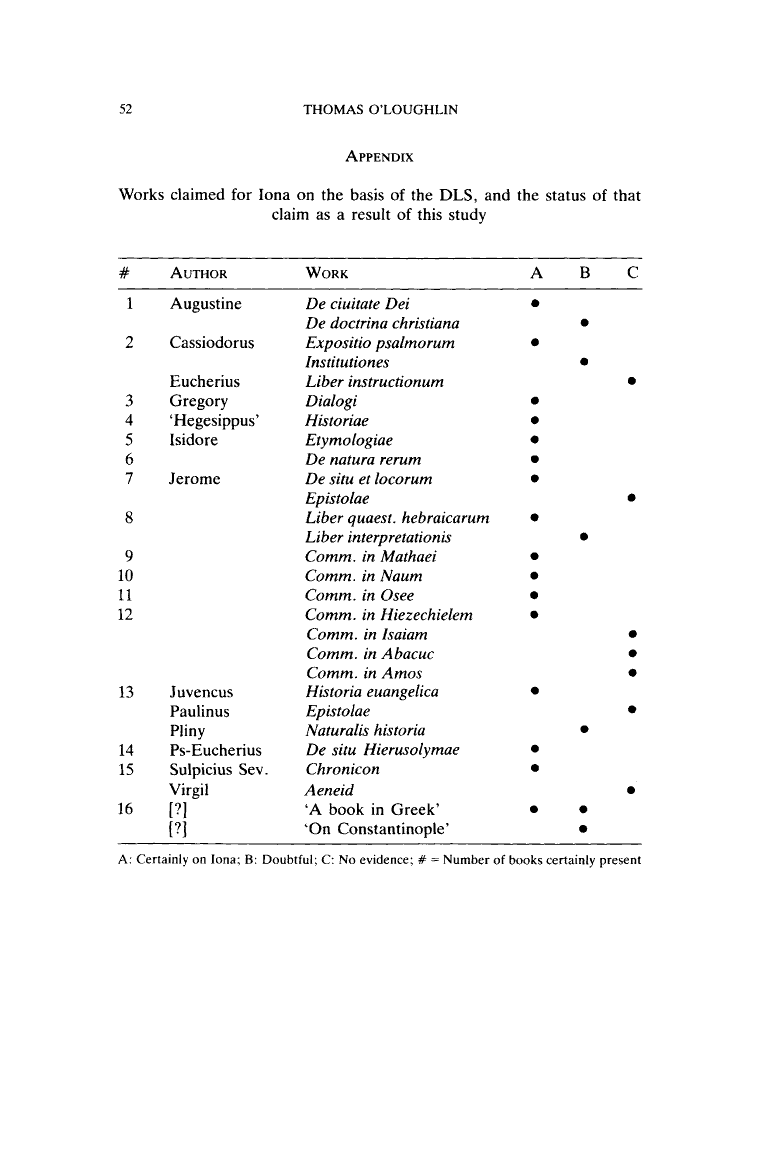
He makes a solid case for each of the texts, although I admit I've only read it through once quickly.

He makes a solid case for each of the texts, although I admit I've only read it through once quickly.
a reply to: beansidhe
Not sure if that list was in response to my querying the existence of a Druid library...I'm guessing not and won't point out that those are classical works of Roman origin which you would expect to find in a scriptorium at that time such as the one that Columba set up.
Not sure if that list was in response to my querying the existence of a Druid library...I'm guessing not and won't point out that those are classical works of Roman origin which you would expect to find in a scriptorium at that time such as the one that Columba set up.
a reply to: Anaana
I know! I know it's wrong to find him attractive for so many, many reasons and yet I just can't help myself.
I would say most of the Irish Annals, like the Lebor Gabala Erenn et al have a huge amount of real history in them, it's just that it's fashionable right now (well, 19th century onwards) to dismiss them out of hand. I shall have to go back and read the Book of Leinster again, and Nennius too while I'm at it.
I know! I know it's wrong to find him attractive for so many, many reasons and yet I just can't help myself.
I would say most of the Irish Annals, like the Lebor Gabala Erenn et al have a huge amount of real history in them, it's just that it's fashionable right now (well, 19th century onwards) to dismiss them out of hand. I shall have to go back and read the Book of Leinster again, and Nennius too while I'm at it.
originally posted by: Anaana
a reply to: beansidhe
Not sure if that list was in response to my querying the existence of a Druid library...I'm guessing not and won't point out that those are classical works of Roman origin which you would expect to find in a scriptorium at that time such as the one that Columba set up.
No, that was in response to oletimer looking for O'Loughlin's book in which he is considering where Adomnan drew on his resources for De Locis Sanctis. I forgot to 'reply' to him and so it looks like a random rebuke when in fact it's not meant to.
a reply to: beansidhe
No, no I'm with you, there is definately something of a je ne sais quoi there...but he must have had about half a dozen scarf changes per episode. It's distracting...and makes you wonder what's going on under there, until you can't think of anything else...
...or perhaps that's just me
No, no I'm with you, there is definately something of a je ne sais quoi there...but he must have had about half a dozen scarf changes per episode. It's distracting...and makes you wonder what's going on under there, until you can't think of anything else...
...or perhaps that's just me
edit on 23-12-2015 by Anaana because: o and i in the wrong order, I have no French to pardon
new topics
-
Hurt my hip; should I go see a Doctor
General Chit Chat: 23 minutes ago -
Israel attacking Iran again.
Middle East Issues: 1 hours ago -
Michigan school district cancels lesson on gender identity and pronouns after backlash
Education and Media: 1 hours ago -
When an Angel gets his or her wings
Religion, Faith, And Theology: 2 hours ago -
Comparing the theology of Paul and Hebrews
Religion, Faith, And Theology: 3 hours ago -
Pentagon acknowledges secret UFO project, the Kona Blue program | Vargas Reports
Aliens and UFOs: 4 hours ago -
Boston Dynamics say Farewell to Atlas
Science & Technology: 4 hours ago -
I hate dreaming
Rant: 5 hours ago -
Man sets himself on fire outside Donald Trump trial
Mainstream News: 7 hours ago -
Biden says little kids flip him the bird all the time.
Politicians & People: 7 hours ago
top topics
-
The Democrats Take Control the House - Look what happened while you were sleeping
US Political Madness: 7 hours ago, 17 flags -
In an Historic First, In N Out Burger Permanently Closes a Location
Mainstream News: 9 hours ago, 15 flags -
A man of the people
Medical Issues & Conspiracies: 15 hours ago, 10 flags -
Biden says little kids flip him the bird all the time.
Politicians & People: 7 hours ago, 8 flags -
Man sets himself on fire outside Donald Trump trial
Mainstream News: 7 hours ago, 7 flags -
Pentagon acknowledges secret UFO project, the Kona Blue program | Vargas Reports
Aliens and UFOs: 4 hours ago, 6 flags -
Michigan school district cancels lesson on gender identity and pronouns after backlash
Education and Media: 1 hours ago, 4 flags -
Boston Dynamics say Farewell to Atlas
Science & Technology: 4 hours ago, 4 flags -
4 plans of US elites to defeat Russia
New World Order: 16 hours ago, 4 flags -
Sheetz facing racial discrimination lawsuit for considering criminal history in hiring
Social Issues and Civil Unrest: 7 hours ago, 3 flags
active topics
-
Hurt my hip; should I go see a Doctor
General Chit Chat • 2 • : Boomer1947 -
MULTIPLE SKYMASTER MESSAGES GOING OUT
World War Three • 49 • : Zaphod58 -
A man of the people
Medical Issues & Conspiracies • 14 • : chr0naut -
British TV Presenter Refuses To Use Guest's Preferred Pronouns
Education and Media • 68 • : ToneD -
MH370 Again....
Disaster Conspiracies • 9 • : WakeUpBeer -
Israel attacking Iran again.
Middle East Issues • 17 • : visitedbythem -
Michigan school district cancels lesson on gender identity and pronouns after backlash
Education and Media • 7 • : Vermilion -
Elites disapearing
Political Conspiracies • 34 • : annonentity -
Vogt and the twelve thousand year cycle
Fragile Earth • 29 • : annonentity -
The Democrats Take Control the House - Look what happened while you were sleeping
US Political Madness • 65 • : lilzazz
